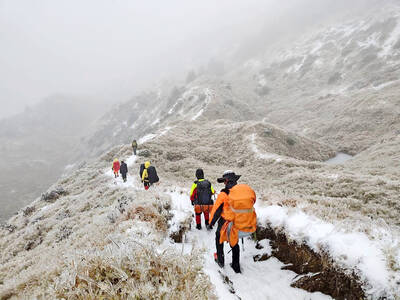A record-high number of waste collection vehicles have been equipped with an Environmental Protection Administration GPS tracking system to monitor the flow of toxic materials and deter illegal disposal.
The EPA yesterday said its GPS system was fitted in a total of 8,888 trucks in the nation as of last year, a significant increase from 270 vehicles in 1992, following an amendment to the Waste Disposal Act (廢棄物清理法) that requires vehicles transporting regulated waste to install the GPS tracking device.
The 8,888 trucks account for 64 percent of all vehicles in the nation that transport regulated waste, with those containing the GPS system shipping 14 million tonnes of industrial wastes last year, Department of Waste Management Director Wu Sheng-chung (吳盛忠) said.
Regulated waste includes 267 types of industrial waste, such as chemicals, sludge, solution, medical waste and animal corpses, while reusable waste, including slag and waste building materials, represents a majority of industrial waste transported, or 9.3 million tonnes.
The tracking system detects about 10,000 suspected violations every year, according to vehicle activity and route analysis. About 0.9 percent of suspected violations can be verified, while most violations involve illicit transportation of dead pigs, Wu said.
Twenty-nine percent of trucks equipped with the GPS system are in central Taiwan, while 27 percent are in southern regions and 20 percent in northern regions, which matches the distribution of industries in the nation.
Local environmental agencies can enter an illegal dumping hotspot into the system, which issues a warning any time a vehicle with a tracking device enters the hotspot, with 1,300 hotspots nationwide already in the system, Wu said.
However, when questioned by reporters over the tracking system monitoring the flow of regulated waste from their sources to processors and recyclers, but being unable to detect subsequent transportation and illegal dumping by untrackable vehicles, Wu said that the system is not flawless.
“The system can only be used to monitor registered vehicles, but it is more or less powerless against intentional violators, who can hire unregistered vehicles to transport waste undetected. However, the practice is illegal and liable to heavy punishment, while we are planning a new tracking device with new technology,” he said.
Wu said the new device could not be revealed yet and urged waste processors to abide by the law.

Trips for more than 100,000 international and domestic air travelers could be disrupted as China launches a military exercise around Taiwan today, Taiwan’s Civil Aviation Administration (CAA) said yesterday. The exercise could affect nearly 900 flights scheduled to enter the Taipei Flight Information Region (FIR) during the exercise window, it added. A notice issued by the Chinese Civil Aviation Administration showed there would be seven temporary zones around the Taiwan Strait which would be used for live-fire exercises, lasting from 8am to 6pm today. All aircraft are prohibited from entering during exercise, it says. Taipei FIR has 14 international air routes and

The Ministry of National Defense (MND) today released images of the military tracking China’s People's Liberation Army (PLA) movements during the latest round of Chinese drills around Taiwan. The PLA began "Justice Mission 2025" drills today, carrying out live-fire drills, simulated strikes on land and maritime targets, and exercises to blockade the nation's main ports. The exercises are to continue tomorrow, with the PLA announcing sea and air space restrictions for five zones around Taiwan for 10 hours starting from 8:30am. The ministry today released images showing a Chinese J-16 fighter jet tracked by a F-16V Block 20 jet and the

Snow fell on Yushan (Jade Mountain, 玉山) yesterday morning as a continental cold air mass sent temperatures below freezing on Taiwan’s tallest peak, the Central Weather Administration (CWA) said. Snowflakes were seen on Yushan’s north peak from 6:28am to 6:38am, but they did not fully cover the ground and no accumulation was recorded, the CWA said. As of 7:42am, the lowest temperature recorded across Taiwan was minus-5.5°C at Yushan’s Fengkou observatory and minus-4.7°C at the Yushan observatory, CWA data showed. On Hehuanshan (合歡山) in Nantou County, a low of 1.3°C was recorded at 6:39pm, when ice pellets fell at Songsyue Lodge (松雪樓), a

NO SHAME IN RETREAT: Hikers should consider turning back if the weather turns bad or if they do not have sufficient equipment, the Taroko park headquarters said Two people died of hypothermia over the weekend while hiking on Hsuehshan (雪山), prompting park authorities to remind hikers to bring proper equipment and consider their physical condition before setting out in the cold weather. Temperatures dropped over the weekend, bringing snow to high altitudes in Shei-pa National Park. One hiker, surnamed Lin (林), who on Friday was traveling with a group of six along the Hsuehshan west ridge trail, lost consciousness due to hypothermia and died, the Shei-pa National Park Headquarters said. On Saturday, another hiker, surnamed Tien (田), in a group of five on the southeast of the west